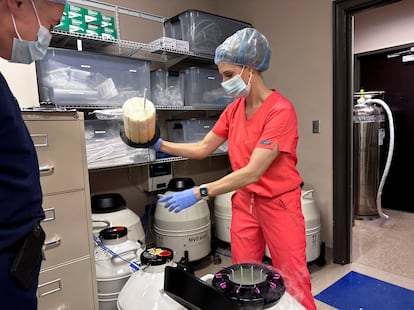Alabama lawmakers advance legislation to protect IVF providers, with final approval still ahead
Committees in the state Senate and House approved nearly identical bills that would protect providers from lawsuits and criminal prosecution for the ‘damage or death of an embryo’ during IVF services

Alabama lawmakers facing public pressure to get in vitro fertilization services restarted in the state advanced legislation Tuesday to shield providers from the fallout of a court ruling that equated frozen embryos to children.
Committees in the state Senate and House approved nearly identical bills that would protect providers from lawsuits and criminal prosecution for the “damage or death of an embryo” during IVF services. Lawmakers are aiming to give final approval Wednesday and send the legislation to Gov. Kay Ivey to be signed into law.
“We anticipate the IVF protections legislation to receive final passage this week and look forward to the governor signing it into law,” Ivey spokeswoman Gina Maiola said.
Three major IVF providers paused services after the Alabama Supreme Court ruling last month that three couples who had frozen embryos destroyed in an accident at a storage facility could pursue wrongful death lawsuits for their “extrauterine children.” The ruling, treating an embryo the same as a child or gestating fetus under the wrongful death statute, raised concerns about civil liabilities for clinics.
The court decision caused an immediate backlash as groups across the country raised concerns about a court ruling recognizing embryos as children. Patients in Alabama shared stories of having upcoming embryo transfers abruptly canceled and their paths to parenthood put in doubt.
Republicans in the GOP-dominated Alabama Legislature are looking to the immunity proposal as a solution to clinics’ concerns. But they have shied away from proposals that would address the legal status of embryos created in IVF labs.
“Let’s get IVF restarted ASAP,” Fertility Alabama, one of the providers that paused services, wrote in a social media post urging support for the bill.
However, The American Society for Reproductive Medicine, a group representing IVF providers across the country, said the legislation does not go far enough.
Sean Tipton, a spokesman for the organization, said Monday that the legislation does not correct the “fundamental problem,” which he said is the court ruling “conflating fertilized eggs with children.”
House Democrats proposed legislation last week stating that a human embryo outside a uterus can not be considered an unborn child or human being under state law. Democrats argued that was the most direct way to deal with the issue. Republicans have not brought the proposal up for a vote.
The GOP proposals state that “no action, suit, or criminal prosecution for the damage to or death of an embryo shall be brought for “providing or receiving services related to in vitro fertilization.” The legislation would apply retroactively except in cases where litigation is already underway.
Sign up for our weekly newsletter to get more English-language news coverage from EL PAÍS USA Edition
Tu suscripción se está usando en otro dispositivo
¿Quieres añadir otro usuario a tu suscripción?
Si continúas leyendo en este dispositivo, no se podrá leer en el otro.
FlechaTu suscripción se está usando en otro dispositivo y solo puedes acceder a EL PAÍS desde un dispositivo a la vez.
Si quieres compartir tu cuenta, cambia tu suscripción a la modalidad Premium, así podrás añadir otro usuario. Cada uno accederá con su propia cuenta de email, lo que os permitirá personalizar vuestra experiencia en EL PAÍS.
¿Tienes una suscripción de empresa? Accede aquí para contratar más cuentas.
En el caso de no saber quién está usando tu cuenta, te recomendamos cambiar tu contraseña aquí.
Si decides continuar compartiendo tu cuenta, este mensaje se mostrará en tu dispositivo y en el de la otra persona que está usando tu cuenta de forma indefinida, afectando a tu experiencia de lectura. Puedes consultar aquí los términos y condiciones de la suscripción digital.








































